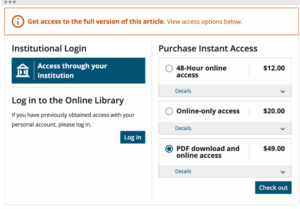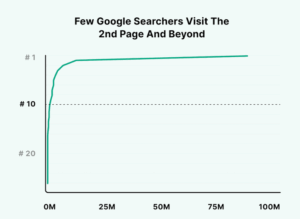Imagine this: you’re a fitness coach, genuinely trying to help your client navigate pain management. They ask about the long-term safety of NSAIDs (like ibuprofen), especially after intense workouts. You hop on Google Scholar, type in “long-term effects of NSAIDs in athletes,” and scan the top five studies.
They all say something like: “short-term use appears safe,” “no conclusive evidence of long-term harm,” or “potential risks require more research.”
Sounds reassuring, right? But what if that’s just the surface? What if the results you’re seeing are not the most balanced or comprehensive selection of what’s available, but rather a filtered, incentivized ranking system that favors certain voices, studies, or institutions over others?
results you’re seeing are not the most balanced or comprehensive selection of what’s available, but rather a filtered, incentivized ranking system that favors certain voices, studies, or institutions over others?
Welcome to the search trap – a subtle but powerful digital funnel that shapes your understanding of health, often without your consent or awareness.
The Illusion of Neutrality
Google is often treated like a neutral librarian: objective, helpful, and all-knowing. But it’s actually more like a gatekeeper, curating results based on algorithms that take into account authority, popularity, engagement, and – let’s not forget – advertising revenue and institutional partnerships.
Dr. Robert Epstein, a psychologist and former editor-in-chief of Psychology Today, has called this out as the Search Engine Manipulation Effect (SEME). His research shows that simply adjusting the order of search results can shift user opinions, including political voting preferences, without users realizing they’ve been influenced at all.
Now apply that to something that is much easier to manipulate – health research.
If the first page of search results reinforces a certain belief (e.g., “NSAIDs are safe in the short term”), most people won’t click past that. Even well-meaning coaches, practitioners, and athletes can be misled into making decisions based on algorithmic bias rather than a true representation of evidence.
The Problem With “Do Your Own Research”
“Do your own research” is a phrase that gets thrown around in wellness circles a lot – and often for good reason. But what does research really mean when the search engine itself is biased?
Let’s say, hypothetically, there are 15 solid studies showing potential long-term harms of frequent NSAID use in athletes: impacts on gut health, kidney function, cardiovascular risk, or even muscle recovery.
But those studies:
- Are published in lower-impact journals
- Use cautious or non-definitive language
- Don’t have SEO-optimized abstracts
- Aren’t cited often (yet)
Meanwhile, studies funded by pharmaceutical companies or affiliated with major institutions might rise to the top, not because they’re better, but simply because they’re more algorithmically favorable.
Suddenly, your “research” looks like a green light when, in reality, you’ve only seen the tip of a very biased iceberg.
Buried Behind Paywalls: When Good Science Gets Hidden
Even if a study does offer critical insight into the long-term risks of NSAID use, there’s a good chance it’s locked behind a paywall. Unless you’re affiliated with a university, medical institution, or you’re willing to pay $30–$60 per article, you’re effectively shut out of access.
This creates a serious barrier, not just for the average person trying to do their own research, but for independent coaches, trainers, and wellness professionals who don’t have academic access. Meanwhile, open-access studies (often funded by pharmaceutical companies or major institutions) dominate the visibility landscape. These papers may be easier to find and read, but they also tend to align with institutional or commercial interests.
In other words, the pay-to-play dynamic exists in academic publishing too, and it influences what information surfaces when you search. Some of the most rigorous or skeptical work may never even hit your radar – not because it’s flawed, but because it’s financially or structurally out of reach.
So when you’re scanning the top results, it’s not just about what ranks – it’s about what’s missing entirely.
The Real-World Risk
For the average person trying to do a little better – eat cleaner, recover smarter, avoid unnecessary medications – this skewed search landscape is dangerous. It encourages passive trust in curated results, which can undermine your body intuition, your desire for holistic insight, and your ability to spot conflicts of interest in medical research.
And if you’re a health coach, trainer, or any sort of wellness advocate, this isn’t just about personal choices. It’s about your professional suggestions, your credibility, and your clients’ outcomes.
You might say something like, “Yeah, NSAIDs are fine post-workout – no long-term harm according to the research,” without realizing that the research you saw was filtered through layers of bias that you were completely unaware of.
What Can Be Done?
We can’t necessarily fix Google, but we can be more aware of the digital terrain we’re walking through. Here are a few ways to combat the search trap:
1. Go Beyond the First Page
Most people stop at the top five results. Make it a habit to dig deeper – pages 2, 3, or even 4. Sometimes the gems are buried.
2. Use Multiple Search Engines
Try DuckDuckGo, Brave, or Ecosia. They each have very different ranking algorithms and privacy policies. The diversity in results you get compared to Google can be pretty mind-blowing.
3. Look for Meta-Analyses and Systematic Reviews
These offer broader views of a topic by analyzing many studies at once. Even if the conclusions are cautious, they’re less likely to reflect a single institutional or funding bias.
4. Ask Who Funded the Study
Always scroll down to the conflict of interest section. If the study was funded by a pharmaceutical company, read with extra scrutiny.
5. Think Like a Skeptic, Not a Cynic
You don’t need to distrust everything, but you should question how information is prioritized and presented. Are you seeing what’s true, or just what’s popular and paid for?

Final Thoughts: Tech Ethics Is Now Health Ethics
We’re living in a time where search engines act as a conduit for health consultants, and that should terrify us a little. It no longer takes direct censorship or maniacal conspiracy to distort the truth, it just takes a profit-driven algorithm and a passive user base.
So if you’re someone trying to live better, feel stronger, or guide others toward better health, remember this: how you search is just as important as what you search.
The next time you look something up – especially something that impacts a body, a mind, or a life – take a moment to ask: Who decided this was the best result? Because the answer might just change everything.







